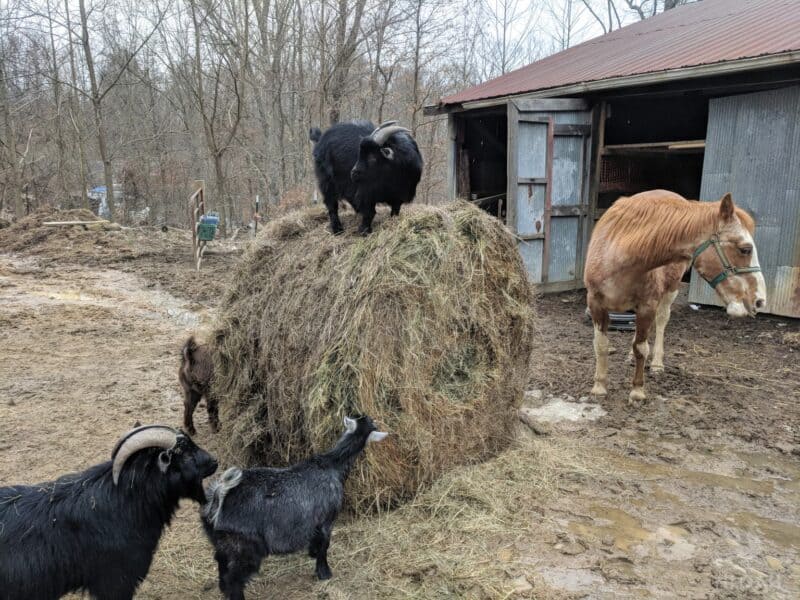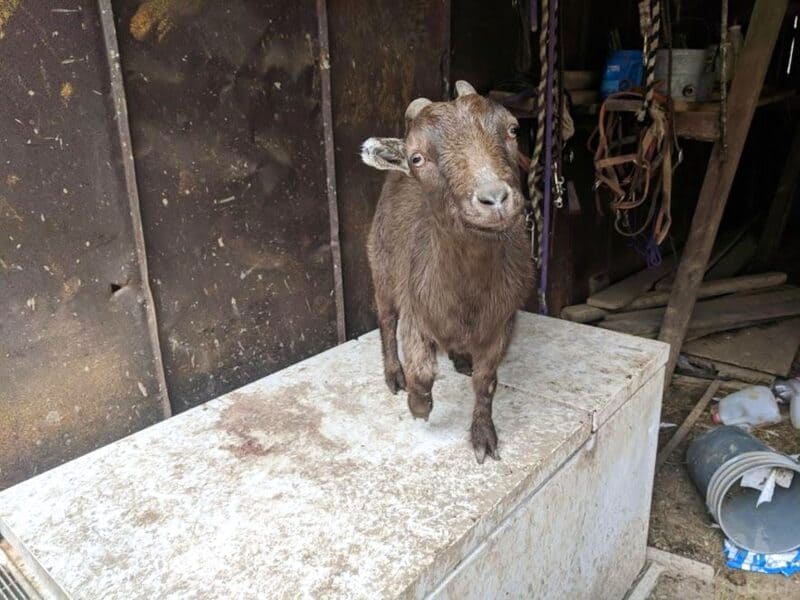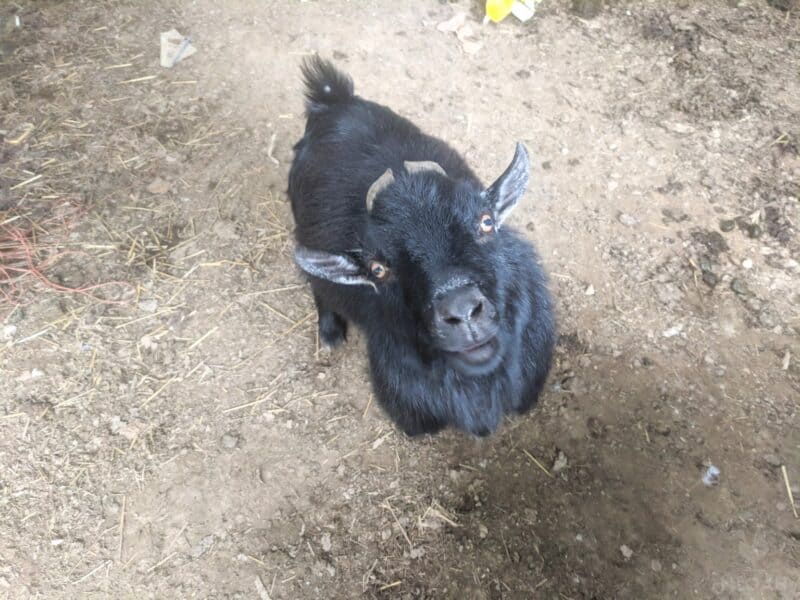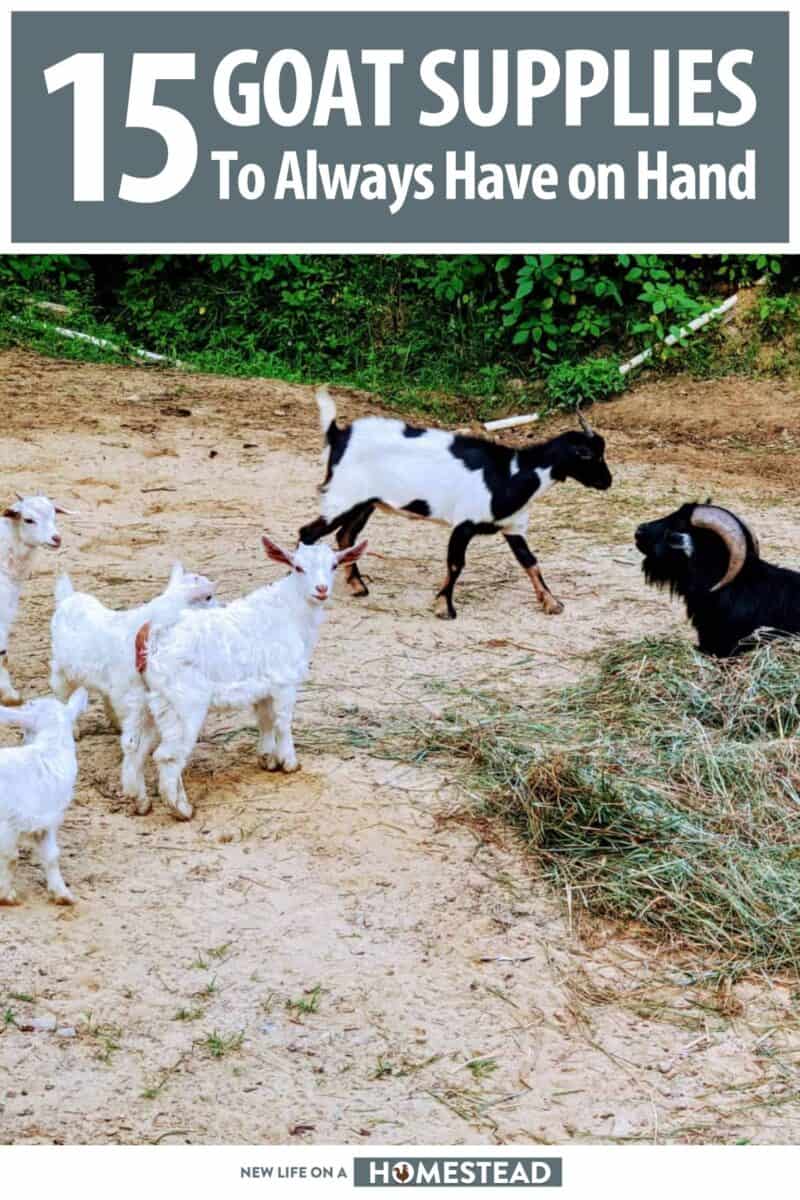However you might feel about goats, there is one thing for certain and that’s the fact that they are pesky creatures. I don’t know why this is. Maybe goats are just perfectly sized to be downright annoying, or maybe it has something to do with their inherent disposition.

It seems like no matter what you do they’re always getting sick, getting into trouble, needing care or just needing something from you.
And I mean way more than other livestock species, too! But, despite all this, we love the little things anyway.
And if you love your goats that means you want to take care of them, and to do that you’re going to need plenty of supplies and the ride equipment.
Below is a list of 15 items that you should always keep on hand for taking care of your goats…

1. Hay
Unless you are blessed with bountiful pasture, hay is a crucial component of a goat’s diet you’ll need to keep on hand in great abundance.
Goats are herbivores and require high-fiber forage such as hay for their digestive system to function properly.
Additionally, hay provides essential nutrients such as protein, vitamins, and minerals that are necessary for goat health and growth.
Since a mature goat can eat around 2-3% of their body weight in hay each and every day, you will really be going through the stuff!
2. Water
Like all animals, goats require access to clean, fresh water at all times to maintain their health and well-being.
Water is necessary for various bodily functions, including digestion, waste removal, and temperature regulation.
Inadequate hydration can lead to serious health problems for goats, such as dehydration, urinary tract infections, and even kidney failure.
Additionally, goats that are not properly hydrated may experience decreased milk production, weight loss, and reduced fertility.
However you store it, make sure it is fresh, clear and free of all contamination.
3. Mineral Supplements
Goats need more than just hay and water to stay healthy. They also require additional minerals such as calcium, phosphorus, salt and trace minerals to maintain their overall health.
Don’t assume that goats are getting all the minerals they need form their hay, even if it was previously tested: the quality and content of hay changes radically with each harvest!
Accordingly, mineral supplements are a convenient way for goat owners to ensure their goats are getting all the nutrients they need in one convenient dose.
These supplements usually come in the form of a powder you can add to a goat’s food, or sometimes their water.
4. Liquid Nutrient Formula
Every now and then, you’ll have a goat that is so stressed or malnourished that it just starts to break down.
This might be caused by illness, weather, harsh birthing process, injury or age. In these cases, it is essential to give them a boost of nutrition at once so their body does not get out of whack and start a downward spiral toward death.
This is easily done with a liquid nutrient formula like Nutri-Drench.
Liquid nutrient formulas are chock full of vitamins, minerals and electrolytes as well as carbohydrates and proteins – all of which can help a goat’s body recover from stress or malnutrition.
These formulas come in liquid form so they can be quickly and easily digested and just as easily administered with a large, specialized syringe directly into a goat’s mouth.
It is always wise to have some on hand in case of emergencies!
5. Straw / Other Bedding
Goats, like all animals, need a safe, warm, soft place to lie down and rest. That’s why you should provide them with plenty of straw or other suitable bedding material such as wood shavings.
Bedding material helps keep goats dry and warm, prevents injuries from sleeping on hard ground, keeps their hooves healthy and provides extra insulation in cold weather.
It also absorbs moisture helping to keep the shelter clean and smelling fresh, something we all can appreciate.
6. Molasses
To the uninitiated, molasses might seem like a strange thing on a list of must-have goat supplies. But it really is your ace in the hole during times of stress or just hot weather.
This is because molasses is a great source of energy and easy to digest, all of which can help a goat stay strong in times of need.
All you need to do is mix molasses in with the goats’ water supply when it is hot out or any time your goats seem like they need a boost.
Molasses also has other benefits like reducing stress, boosting their immune system and even improving fertility in bucks! It’s one of those supplies that might not get used all that often but when you do, you’ll be glad you had it!

7. Dewormer
The sad fact of the matter is that goats are particularly prone to parasites, worms being the most common.
As such, it is important to be prepared with a dewormer just in case these little pests make their way into your herd.
You have two options, broadly: you can choose all-natural, non-toxic herbal dewormers or commercially available meds like Ivomec.
Each have their pros and cons with the natural route being more forgiving on the environment and entailing less complications with milk or meat.
But, it may take longer to show results, whereas a medicated dewormer will usually kill off the worms quickly and effectively (with more side effects).
Whichever you choose, make sure to follow the instructions carefully; don’t forget that most dewormers need to be repeated on a dosing schedule.
It is recommended that you deworm your goats at least twice a year and maybe more if they have been exposed to wild animals or show excessive coughing, listlessness or rough coat texture.
8. Baking Soda
Another odd inclusion, but only to beginners! Goats are ruminant animals, which means they have a complex four-chambered stomach.
This digestive system is complex and finely balanced when things are working well, but things can go bad quickly and kill the goat when it is disrupted.
This makes goats particularly bloat, which can be agonizing and deadly if left untreated.
Having some baking soda on hand at all times is a must because it can help reduce gas in the goat’s stomach quickly and safely and prevent bloat from happening in the first place.
All you need to do is mix one teaspoon of baking soda with one cup of water and administer orally (with a syringe!) as needed.
9. Antiseptic Wash
Goats are adventurous and often rambunctious. Always frolicking, climbing, playing, tearing down your fences, headbutting each other and you, etc. Accordingly, goats often get little boo-boos.
To prevent infection and heal the wound quickly, you will need an antiseptic wash.
Because goats are always outside and, frankly, getting dirty 24/7 infection is all but certain if a wound is untreated; even small injuries can mean big problems if neglected!
This is a must-have item to have on hand in your goat supplies arsenal, and there are many different types available with various ingredients so just do some research and pick one that works best for you.
You can, though, make your own natural solution at home with things like apple cider vinegar, or you can purchase something pre-mixed online and have it shipped to your door if you don’t have a local supplier.
10. Thermometer
You might have guessed by now that goats tend to suffer from health issues, at least more than other livestock species.
In my experience, this is true. For all of their reputation as tough and invincible eaters, goats have surprisingly delicate constitutions.
Your goats will likely be sick regularly, and the best way to find out when they are, or when they are trending that way, is to take their temperature.
Just like when you were a kid! To do that, you’ll need a thermometer of course. As you’d expect, there are many different types of thermometers, but the best are digital rectal thermometers.
These are the most accurate, easiest to use and best to have on hand. Don’t forget the KY jelly to lubricate the probe!
11. Hoof Trimmer
Goats are sure-footed animals but they still need regular hoof trimmings to stay healthy.
Unfortunately, goat hooves are small, relatively sharp and grow fairly quickly, a combination of factors that leads to many problems.
If you don’t keep the hooves trimmed, your goat could suffer from infections and a decrease in mobility or even lameness which can lead to further health issues.
It’s best to invest in a quality pair of hoof trimmers that are made specifically for goats. This might seem like an unnecessary expense but believe me, it will pay off in the long run because having the right tool makes all the difference in your efforts and the results.
A good pair of trimmers should last you for many years with a little care and be able to quickly trim your goat’s hooves without any fuss or muss.

12. Treats
An essential item, you will need lots and lots of goat treats. Not only because you want your goats to be happy- you do – but also because you want them to listen and mind you!
Goats, like pretty much every animal, are highly food motivated. In fact, many goats won’t listen to you at all if they cannot get some food out of the arrangement!
So, you’ll need to keep a good supply of treats on hand to reward the goats for their cooperation or simply just to show them you love them…
Or, you know, to lure them to or away from where you want them to be!
Goat treats come in all shapes and sizes, from pricey store-bought options to homegrown favorites like apple slices and carrots.
Either way, they’re an essential part of goat ownership and control, so make sure you have plenty of fresh ones on hand.
13. Halter
Goats have a reputation as being somewhat hard to handle, but they don’t have to be. If you use a halter, it can make it far easier to lead a goat and, when necessary, tie them off to keep them in place.
You shouldn’t ever count on having your goat follow you of its own free will, or it standing still while you milk it, shear it or do anything else to it.
And like so many other things goats are very hard on halters, and plenty will go missing, wear out or break so make sure you have several on hand at all times.
14. Transporters
Transporters, or “goat crates” are vital if you ever need to pack up and move your goats for any reason, maybe delivering them to a client or taking them to the vet, having an appropriately sized transporter for your vehicle will make the affair a whole lot easier and safer.
Depending on the size of the goat and the breed, this could be a large dog-style carrier or a metal wire cage.
Any like that can do the job, but just like gates make sure they latch securely so your goats can’t figure out how to open them while they are inside!
15. Shears and Clippers
Giving your goats a haircut is not just something you should do if you are showing them. A nice trim and a sanitary shave or buzz cut is a great thing for the overall health and wellness of your goats and for you.
Shaving around their chin, backsides, reproductive organs and teats will make cleaning up mishaps from milking or a bad case of scours much quicker and easier without all that hair in the way.
I highly recommend having multiple sets since these tools seem to break down quickly, and you’ll want to get right back to work when that happens. Switch to your spare and fix or replace the other one later.

Tom has lived and worked on farms and homesteads from the Carolinas to Kentucky and beyond. He is passionate about helping people prepare for tough times by embracing lifestyles of self-sufficiency.
